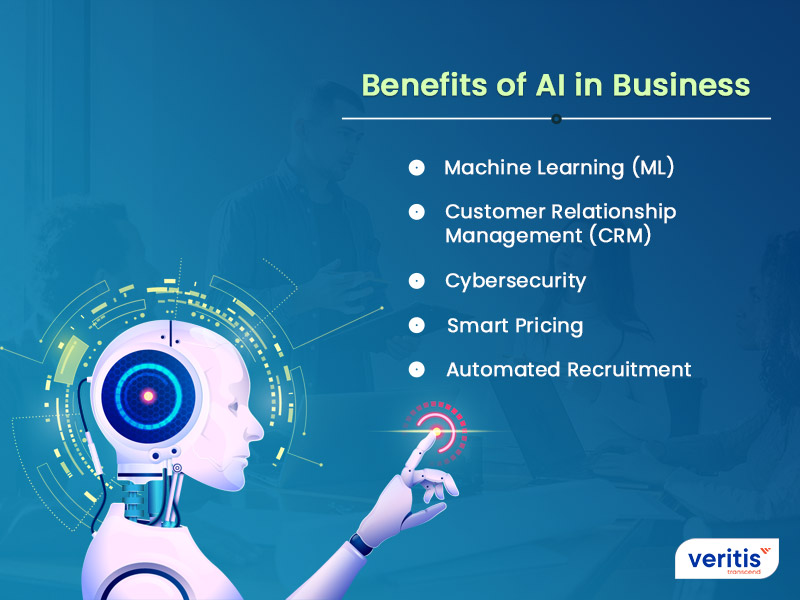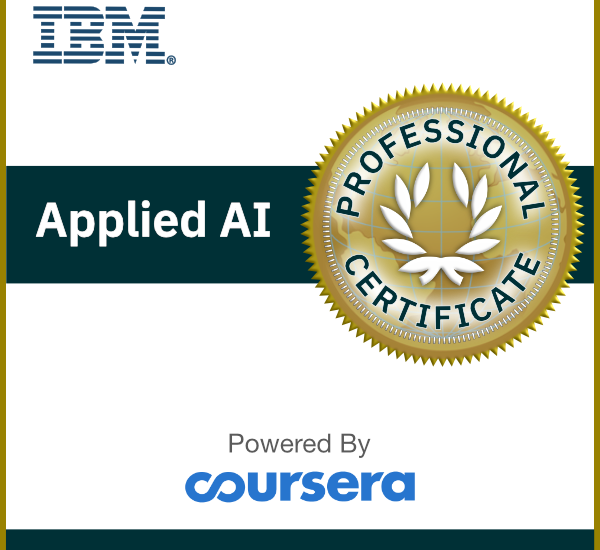Artificial Intelligence (AI) is revolutionizing the business world at an unprecedented pace. From automating repetitive tasks to delivering personalized customer experiences, AI has become a key driver of growth and innovation for businesses of all sizes.
Toc
In this comprehensive guide, we will explore how businesses can unlock the power of AI to improve efficiency, increase revenue, and stay ahead of the competition.
Introduction to Artificial Intelligence (AI) in Business

Artificial Intelligence (AI) is transforming the business landscape at an unprecedented rate. At its core, AI involves the use of algorithms and machine learning to perform tasks that traditionally require human intelligence. From automating routine processes to providing deep insights through data analysis, AI is revolutionizing how businesses operate.
The significance of AI in business cannot be overstated. According to a recent report by Gartner, AI augmentation will create $2.9 trillion in business value by 2021 and save 6.2 billion hours of worker productivity globally. This article explores the growing impact of AI on business operations, the benefits it offers, challenges to consider, future trends, and practical tips for business owners looking to integrate AI into their operations.
Understanding Artificial Intelligence
AI refers to the ability of machines to perform tasks that typically require human intelligence. These tasks include visual perception, decision making, speech recognition, and language translation. The goal of AI is to create intelligent machines that can think and act like humans, or even surpass human capabilities.
There are three main branches of AI: narrow or weak AI, general or strong AI, and artificial superintelligence. Narrow AI is the most common form of AI used in business today. It is designed to perform specific tasks within a limited domain, such as facial recognition or voice assistants. General AI seeks to replicate human intelligence and can perform a wide range of tasks across multiple domains. Artificial superintelligence refers to an advanced level of intelligence that surpasses human abilities.
Benefits of AI in Business
The integration of AI into business operations offers numerous benefits, including improved efficiency, cost savings, increased accuracy and productivity, enhanced customer experiences, and better decision making.
AI-powered automation reduces the time spent on routine tasks like data entry and processing, freeing up employees to focus on more complex and strategic tasks. This leads to increased efficiency and productivity, as well as cost savings for businesses.
AI also enables businesses to make data-driven decisions by analyzing large amounts of data quickly, identifying patterns and trends, and providing valuable insights. This improves decision making accuracy and reduces the risk of human error.
Moreover, AI-powered chatbots and virtual assistants improve customer experiences by providing instant support and personalized interactions. This can lead to higher customer satisfaction levels and increased brand loyalty.
Challenges of Adopting AI in Business

While the benefits of AI in business are undeniable, there are also challenges to consider when implementing AI into business operations. These include data privacy and security concerns, lack of skilled professionals, and potential job displacement.
Initial Investment and ROI
The initial investment required to implement AI solutions can be a significant barrier for many businesses. This includes expenses related to technology acquisition, software development, and the necessary infrastructure upgrades. Smaller enterprises, in particular, may find it challenging to allocate a tight budget to AI initiatives. However, it is crucial to view this expenditure as a long-term investment rather than a short-term cost. As AI technologies mature, the potential return on investment (ROI) tends to increase substantially.
Businesses that successfully integrate AI can expect to see improvements in operational efficiency and customer engagement, which translate into increased revenue over time. A well-crafted strategy that outlines clear objectives, potential impact, and measurable outcomes can help in justifying the initial costs. Ultimately, the key lies in selecting AI solutions that align not only with immediate needs but also with long-term business goals, ensuring that the investment yields the desired benefits in the future.
Data Privacy and Security Concerns
As businesses increasingly rely on AI technologies, data privacy and security have emerged as pressing concerns. The deployment of AI often necessitates the collection and analysis of vast amounts of sensitive data, raising the stakes for potential data breaches and misuse. Companies must navigate complex regulations, such as the General Data Protection Regulation (GDPR) in Europe, which imposes strict requirements on how personal data is handled. Ensuring that AI systems are compliant with these regulations is vital to protect consumer trust and avoid hefty fines.
Furthermore, as AI systems become more sophisticated, ensuring the security of the algorithms themselves is paramount. This includes safeguarding against adversarial attacks, where malicious actors might exploit vulnerabilities within an AI model to manipulate its output. Businesses should take a proactive approach to address these concerns by implementing robust cybersecurity measures, conducting regular audits, and prioritizing transparency in how data is used. Fostering a culture of data protection and privacy among employees can also help mitigate risks associated with data handling and reinforce customer confidence in the organization’s commitment to security.
Workforce Retraining and the Human-AI Collaboration
As AI continues to reshape business landscapes, the need for workforce retraining becomes increasingly critical. Many roles may evolve or become obsolete due to automation, prompting the necessity for employees to acquire new skills that complement AI technologies. This shift doesn’t signal a replacement of the human workforce, but rather an opportunity for collaboration between humans and machines. Businesses must invest in upskilling their employees, offering training programs focused on understanding AI capabilities and leveraging them to enhance their own productivity.
To foster a culture of human-AI collaboration, organizations should prioritize creating interdisciplinary teams where employees can work alongside AI systems. This synergy can lead to innovative solutions that neither could achieve independently. Moreover, encouraging a mindset of adaptability and continuous learning within the workforce will empower employees to embrace change, understand the value of AI, and utilize it to drive business growth. Ultimately, the goal is to build a workforce that is not only proficient in the use of AI technologies but also equipped to thrive in an increasingly automated environment.
Future Trends in AI for Business

The rapid advancements in AI technology are continuously opening up new possibilities for businesses. As the technology matures, here are some of the future trends in AI that we can expect to see in the business world:
The Role of AI in Decision-making
AI is poised to play an increasingly pivotal role in decision-making processes across businesses. By harnessing the power of machine learning algorithms and predictive analytics, organizations can glean deeper insights from their data, allowing for more informed choices. AI tools can evaluate historical trends, assess real-time data, and simulate various scenarios, ultimately reducing the uncertainties that often accompany strategic decisions.
Moreover, AI enhances collaborative decision-making by providing stakeholders with curated insights tailored to their specific needs, thereby fostering a more informed dialogue among teams. This democratization of data allows for a more inclusive approach to decision-making, enriching discussions with empirical evidence and strategic foresight. As a result, businesses can cultivate a more agile and responsive operational model, adapting quickly to market changes and emerging opportunities while mitigating risks effectively. In this rapidly evolving landscape, those who integrate AI-driven insights into their decision-making frameworks will gain a significant competitive edge, positioning themselves for sustained growth and innovation.
Advancements in Automation and Efficiency
The integration of AI into business processes is set to revolutionize automation and efficiency across various industries. By automating repetitive and mundane tasks, AI technologies free up valuable time for employees to focus on more strategic and creative initiatives. For instance, in manufacturing, AI-driven robots can perform assembly line tasks with precision and speed, drastically reducing production times and minimizing human error. In customer service, AI chatbots are capable of handling routine inquiries, allowing human representatives to concentrate on complex issues that require a personal touch.
Furthermore, advancements in machine learning algorithms enable businesses to optimise their operational workflows, identifying bottlenecks and inefficiencies that can be addressed. Predictive maintenance powered by AI can anticipate equipment failures before they occur, leading to significant cost savings and improved downtime management. As organizations embrace these automation technologies, the overall productivity of the workforce is likely to surge, fostering a culture of innovation and continuous improvement. In essence, AI not only enhances efficiency but also empowers businesses to be more agile, adapting to changes in demand and market conditions with unprecedented responsiveness.
Ethical Considerations in AI Implementation
As businesses increasingly adopt AI technologies, addressing ethical considerations is crucial for responsible deployment. This includes ensuring fairness in AI algorithms to prevent bias that can inadvertently disadvantage specific groups. Organizations must actively work to eliminate discrimination within AI systems by using diverse training data and conducting fairness audits regularly. Transparency is also vital; businesses should clarify how AI decisions are made and what data is being used to bolster consumer trust.
Moreover, the ethical use of AI extends to data privacy. Companies must ensure compliance with regulations, such as the GDPR, not only to avoid penalties but also to maintain their integrity in the eyes of consumers. Ethical AI use promotes a corporate culture of accountability and responsibility, fostering loyalty and confidence among customers. Ultimately, businesses that prioritize ethical considerations in their AI strategies will not only avoid pitfalls but also enhance their brand reputation, aligning their operations with societal values and expectations.
The Importance of Collaboration Across Industries
Collaboration across industries is becoming increasingly important as AI technology evolves. By sharing insights, best practices, and research findings, organizations can accelerate innovation and tackle common challenges associated with AI implementation. Public-private partnerships can also play a significant role in creating standards and frameworks that promote responsible AI development. By working together, stakeholders can navigate potential pitfalls related to bias, security, and ethics more effectively.
In addition, interdisciplinary collaboration can lead to groundbreaking advancements as different fields bring unique perspectives and expertise. For instance, combining knowledge from the healthcare, technology, and agricultural sectors can yield innovative AI solutions tailored to address industry-specific challenges. Fostering such collaborations not only drives technological advancements but also creates a more unified approach to enhancing the societal benefits derived from AI. As this trend continues, industries that embrace collective innovation will gain a substantial advantage in the global marketplace.
Tips for Business Owners on Integrating AI

For businesses looking to integrate AI technologies into their operations, here are some tips to consider:
Start small and scale up
Starting with manageable projects allows businesses to test AI capabilities and measure their impact without overwhelming resources. Identify specific areas where AI can provide immediate benefits, such as automating a repetitive task or enhancing customer support through chatbots. Once these initial implementations demonstrate value, companies can gradually expand their AI initiatives.
Invest in Training and Skill Development
Equipping employees with the necessary skills to work alongside AI technology is critical for successful integration. Offering training programs that focus on data literacy, machine learning basics, and the effective use of AI tools will help staff adapt to new workflows and harness the full potential of AI. This investment not only enhances employee confidence but also fosters a culture of innovation, ensuring that team members are prepared to leverage AI capabilities in their respective roles.
Monitor and Evaluate Performance
Consistently tracking the performance of AI systems is essential to ensure they are delivering the desired results. Implementing key performance indicators (KPIs) tailored to your AI initiatives allows businesses to assess effectiveness and make informed adjustments as needed. Review these metrics regularly and encourage feedback from users to within the organization to identify areas for improvement, ensuring that AI tools continue to align with business goals.
Foster a Culture of Experimentation
Encouraging a culture of experimentation can significantly enhance a company’s ability to innovate with AI technologies. Allow teams to explore new AI applications, test various approaches, and learn from both successes and failures. This openness not only boosts employee morale but also enables organizations to remain agile and responsive as technology changes, ultimately positioning them for long-term success in a rapidly evolving landscape.
Conclusion

In conclusion, the integration of AI technologies within businesses presents a multitude of opportunities for enhancing efficiency, fostering innovation, and driving growth. However, as organizations navigate this complex landscape, they must remain vigilant regarding the ethical implications and challenges that come with deploying AI systems. By prioritizing fairness, transparency, and data privacy, companies can build trust with consumers and ensure that their AI strategies align with societal values. Additionally, collaboration across industries, combined with a commitment to ongoing training and performance evaluation, will empower businesses to harness the full potential of AI. As the business environment continues to evolve, those who embrace responsible AI practices will be better positioned to thrive in a competitive marketplace, ensuring not only their success but also contributing positively to the communities they serve.






